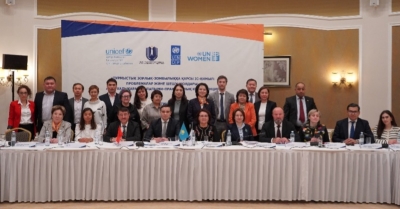Italy overturns ‘superbonus’ scheme for housing renovation

The Italian government led by Prime Minister Giorgia Meloni has adopted a radical overhaul of the country’s feted ‘superbonus’ incentive scheme aimed renovating buildings and improving energy efficiency.
“The superbonus from my point of view was conceived with good intentions,” Meloni said on Sunday (19 February).
“However, the measure was so badly designed and so poorly executed that it generated a huge amount of problems that we have now inherited and are required to address,” she said in a Twitter video explaining the new measures, which were adopted on 16 February.
The superbonus for building renovation was originally introduced in May 2020 as part of the ‘Relaunch Decree’ adopted in the wake of the coronavirus pandemic to restart the Italian economy.
Under the scheme, homeowners could get 110% of renovation expenditure covered by the government.
But it also put a strain on Italian finances, costing more than €105 billion to the state budget, according to Meloni. The scheme was also widely criticised for fuelling inflation and fraud in the construction sector.

Italy’s feted building renovation ‘Superbonus’ comes under scrutiny
Ahead of the Italian elections on 25 September, the Five Star Movement led by Giuseppe Conte proposes stabilising the ‘Superbonus’ scheme for building renovation, while others, including outgoing Prime Minister Mario Draghi, sound the alarm over potential fraud.
Households had three options to claim their subsidy. They could either subtract the renovation costs from their tax returns over a five-year period, or pass it to the building contractor and receive a discount on their invoice. The third option was to sell the credit to a bank or other financial intermediary which then collected the payment for them.
In a move aimed at combatting fraud, the new decree maintains the tax deduction option but eliminates all other possibilities. The decree will not affect works which have already started.
The previous system was “open to fraud,” because the credit could initially be transferred to a bank, to a financial intermediary, or to a company, “without any limit and at the beginning without any control,” Meloni pointed out.
“It’s madness, it’s like the government saying: ‘whoever wants to buy a car, the state will pay for it’. It could never work,” said Carlo Calenda, the leader of the centrist party Azione in comments for Agenzia Italia.
Additionally, the scheme created a bubble in the construction sector by eliminating the divergence of interest between seller and buyer and causing the cost of raw materials such as iron, steel and concrete to skyrocket.
To address this, the Meloni government intervened in January with a measure to lower state incentives from 110% to 90%.
“It’s obvious that, if I have to pay for 10% of the total value of the works, I’ll be more careful with how much I am spending,” Meloni explained, saying the scheme had cost €2,000 for each Italian citizen, including children.
Stranded credits
Another issue created by the scheme are the €15 billion in substandard credits that banks are now struggling to handle, according to data from the National Association of Building Contractors (ANCE).
Many companies that own credits from the superbonus scheme can no longer reclaim them, because they have exhausted the possibility to deduct it from their taxes, and can no longer sell them because banks and other institutions are no longer buying the credit.
The Commission of Inquiry on Banks indicated at the end of June 2022 that “over the two-year period 2020-2022, banks have made commitments for tax credits for a total of €76,989,096,317, saturating their fiscal capacity,” ANCE reports.
“On the superbonus, it was not possible to do otherwise. Now the government will assess the situation that led to some €15 billion in stranded credits,” said Gilberto Pichetto, the Italian Minister for the Environment and Energy Security.
“Companies are going bankrupt not because we stopped the credit transfer, but because no one is buying their credit,” he warned.

Italy’s celebrated building renovation scheme hits a snag
Last year, Italy launched an unprecedented plan allowing homeowners to finance 110% of energy efficiency renovation works through tax deductions. Almost one year on, the widely celebrated scheme is hitting snags related to mounting costs and bureaucracy.
Five Star Movement defends the scheme
The Five Star Movement, which created the scheme, is now protesting against the overhaul, saying that Giorgia Meloni is lying and is running a campaign of ‘psychological terrorism’.
“It is a very serious forgery for a prime minister to parrot an accounting error made by Minister for the Economy Giorgetti,” said Giuseppe Conte, former Prime Minister and leader of the Five Star Movement.
“They represent us, they cannot afford to publicly say these false figures,” Conte said.
“To say that [the scheme] costs €2,000 per person including children is false because the data show there is an immediate 70% return. It means that if you spend 100 you get 70 back, which spread over the 5 years of the superbonus scheme, it becomes €88 per person, not 2,000,” he added.
According to Conte, the measure has “paid for itself” by creating 900,000 jobs and cutting one million tonnes of CO2 emissions.
The superbonus scheme allowed homeowners to save an average of €964 per year, while the total reduction in CO2 emissions is estimated at 1.42 million tonnes, according to a study conducted by the Italian research group Nomisma.
Con quest’ultimo decreto-vergogna che affossa il #Superbonus, il Governo Meloni pugnala alle spalle imprese, lavoratori e cittadini, creando le premesse per una nuova crisi economica e sociale. La mia intervista al Tg3 ⤵️ pic.twitter.com/Mw1alp7NQp
— Giuseppe Conte (@GiuseppeConteIT) February 17, 2023



